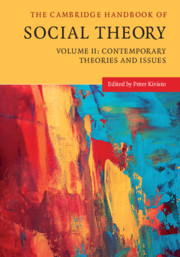Book contents
- The Cambridge Handbook of Social Theory
- The Cambridge Handbook of Social Theory
- Copyright page
- Contents
- Figures
- Tables
- Contributors
- Preface
- 1 Rational Choice Theory and Methodological Individualism
- 2 Network Theories
- 3 Cultural Sociology
- 4 Identity
- 5 Emotions Theory
- 6 Theorizing Sex/Gender: Feminist Social Theory
- 7 Intersectionality as Critical Social Theory
- 8 Modernity
- 9 Realism
- 10 Globalization: Not Good, Bad, or Over
- 11 Time/Space
- 12 Social Theory in the Anthropocene: Ecological Crisis and Renewal
- 13 Embodiment
- 14 Sexualities
- 15 Multiculturalism
- 16 Risk
- 17 Trust and the Variety of Its Bases
- 18 Unities Within Conflict: Mapping Biology’s Relevance to Sociological Theory
- 19 Civil Society
- 20 Social Movements: Sequences vs Fuzzy Temporality
- 21 Immigration
- Index
- References
1 - Rational Choice Theory and Methodological Individualism
Published online by Cambridge University Press: 03 December 2020
- The Cambridge Handbook of Social Theory
- The Cambridge Handbook of Social Theory
- Copyright page
- Contents
- Figures
- Tables
- Contributors
- Preface
- 1 Rational Choice Theory and Methodological Individualism
- 2 Network Theories
- 3 Cultural Sociology
- 4 Identity
- 5 Emotions Theory
- 6 Theorizing Sex/Gender: Feminist Social Theory
- 7 Intersectionality as Critical Social Theory
- 8 Modernity
- 9 Realism
- 10 Globalization: Not Good, Bad, or Over
- 11 Time/Space
- 12 Social Theory in the Anthropocene: Ecological Crisis and Renewal
- 13 Embodiment
- 14 Sexualities
- 15 Multiculturalism
- 16 Risk
- 17 Trust and the Variety of Its Bases
- 18 Unities Within Conflict: Mapping Biology’s Relevance to Sociological Theory
- 19 Civil Society
- 20 Social Movements: Sequences vs Fuzzy Temporality
- 21 Immigration
- Index
- References
Summary
A wide version of rational choice theory (RCT) is presented in this article, for which all of the common objections to the narrow – or economic – version do not apply. The wide version explains the decisions of real actors, taking into account the situations in which action takes place.It further indicates how this theory can be applied to explain macro phenomena, an approach predicated on methodological individualism.
Agent-based modeling, game theory, methodological individualism, micro–macro modeling, rational choice theory, value expectancy theory
Karl-Dieter Opp is Professor Emeritus at the University of Leipzig and Affiliate Professor at the University of Washington in Seattle.His areas of interest include collective action, political participation, rational choice theory, the philosophy of the social sciences, social norms and institutions, and deviant behavior.
- Type
- Chapter
- Information
- The Cambridge Handbook of Social Theory , pp. 1 - 23Publisher: Cambridge University PressPrint publication year: 2020
References
- 5
- Cited by



